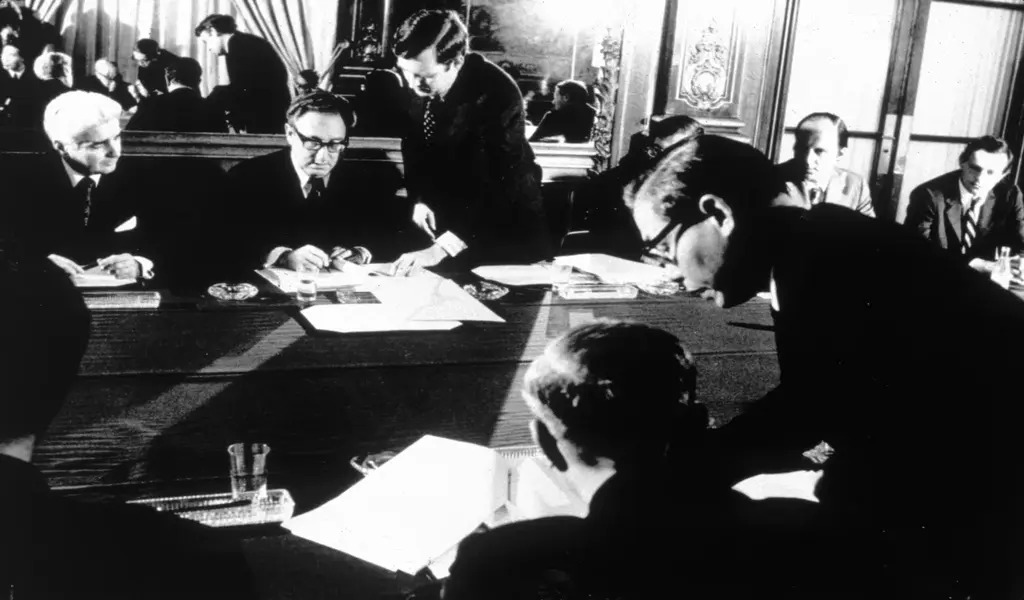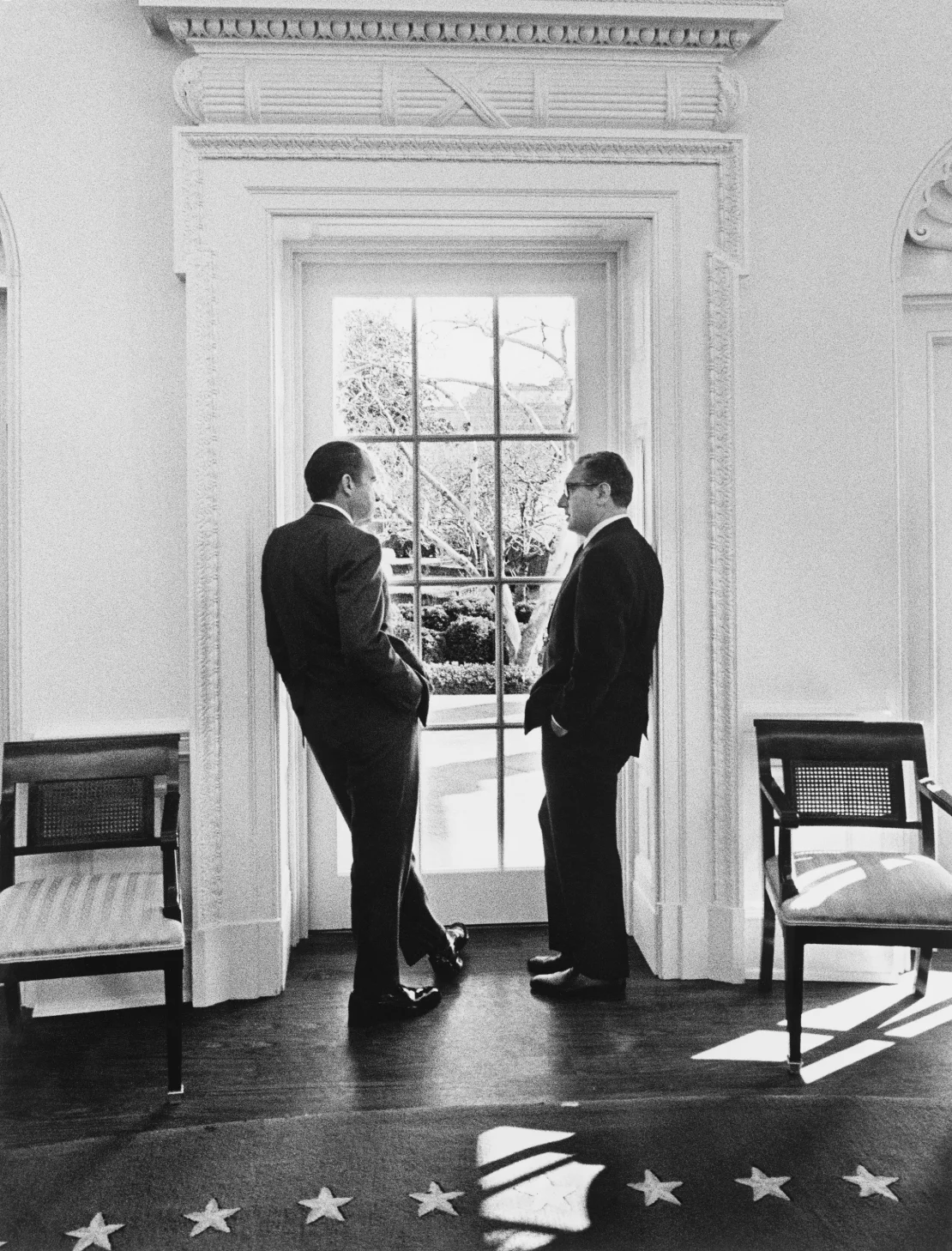(CTN News) – Henry Kissinger, the former US Secretary of State and national security adviser, who fled Nazi Germany in his youth and went on to become one of the most influential and controversial figures in American foreign policy, passed away at the age of 100.
The announcement of his death was made by his consulting firm, Kissinger Associates, which did not disclose the cause of death.
Kissinger played a central role in shaping US foreign policy during the 1970s. He was awarded the Nobel Peace Prize for his efforts in facilitating the conclusion of US military involvement in the Vietnam War.
His secret diplomacy also contributed to President Richard Nixon’s historic opening of communist China to the United States and the West, culminating in Nixon’s visit to the country in 1972.
While Kissinger earned accolades for these achievements, he was also the subject of intense criticism. Many condemned him for the bombing of Cambodia during the Vietnam War, which ultimately contributed to the ascent of the genocidal Khmer Rouge regime.
Additionally, he faced backlash for supporting a coup against a democratically elected government in Chile. Kissinger’s legacy remains a complex and debated aspect of American diplomatic history.
In the Middle East, Kissinger pioneered what became known as “shuttle diplomacy,” intervening to broker agreements between Israeli and Arab forces in the aftermath of the 1973 Yom Kippur War.
His strategy of “détente” in handling US-Soviet relations played a significant role in easing tensions and fostering multiple arms control agreements, shaping the United States’ stance until the Reagan era.
Despite these diplomatic successes, the Nixon-Kissinger administration faced criticism from Congress members who objected to the secrecy surrounding its foreign policy initiatives.
Human rights activists also condemned Kissinger for what they perceived as a disregard for human rights in various countries.
The Vietnam War presented a particularly thorny issue in Kissinger’s legacy. When Nixon assumed office in 1969, pledging a “secret plan” to end the war, approximately 30,000 Americans had already lost their lives in Vietnam.
Despite attempts to shift combat responsibilities to the South Vietnamese government, American involvement persisted throughout Nixon’s administration, with critics accusing him and Kissinger of unnecessarily expanding the conflict.
The culmination of US engagement occurred with the fall of Saigon in 1975, resulting in the loss of over 58,000 American lives.
One of the most controversial aspects of Kissinger’s career was his sharing of the 1973 Nobel Peace Prize with his North Vietnamese counterpart, Le Duc Tho, for their role in the Paris peace accords.
Tho declined the prize, citing the absence of genuine peace in Vietnam, leading to the resignation of two Nobel committee members in protest against the award.
Vietnam War Backlash and Henry Kissinger’s Reflections
Domestic outcry in the United States during the Vietnam War predominantly revolved around the bombings in Laos and Cambodia.
These airstrikes, which became a rallying point for the brutal Khmer Rouge movement, played a role in their recruitment efforts before seizing power and perpetrating one of the most devastating genocides of the 20th century.
Reflecting on the Vietnam War’s impact, Kissinger expressed to CNN’s Wolf Blitzer in 2005, “For me, the tragedy of Vietnam was the divisions that occurred in the United States that made it, in the end, impossible to achieve an outcome that was compatible with the sacrifices that had been made.”
Despite the diminishing influence of Kissinger’s era as a key architect of US foreign policy amid Nixon’s decline during the Watergate scandal, Kissinger remained a prominent and independent figure whose insights on diplomacy continued to resonate.
In 2008, he emphasized the importance of understanding the perceptions of both sides in negotiations, stating to CNN’s Fareed Zakaria, “In order to negotiate, one has to understand the perception of the other side of the world.
And they have to understand our perception. And there has to be a decision on both sides that they’re going to try to reconcile these differences.”
Beyond the realm of international diplomacy, Kissinger garnered attention on a broader scale.
Topping Gallup’s “Most Admired Man” survey for three consecutive years in the 1970s, his personal life, public appearances, and nights at New York’s renowned Studio 54 club regularly made headlines.
Kissinger once humorously remarked, “The nice thing about being a celebrity is that if you bore people, they think it’s their fault.”
Survived by his wife, Nancy, along with two children from his first marriage, Elizabeth and David, as well as five grandchildren, Kissinger’s legacy extends beyond his diplomatic career.
Former President George W. Bush fondly remembered Kissinger, acknowledging “his wisdom, his charm, and his humor.”
Reflecting on Kissinger’s remarkable life journey, Bush highlighted his escape from Nazi persecution as a young boy from a Jewish family and his subsequent service in the United States Army, fighting against the very forces he had fled.
In a statement, Bush expressed gratitude for Kissinger’s contributions, noting, “When he later became Secretary of State, his appointment as a former refugee said as much about his greatness as it did America’s greatness.
He worked in the Administrations of two Presidents and counseled many more. I am grateful for that service and advice, but I am most grateful for his friendship.”
Shaping Perspectives: Kissinger’s Holocaust Experience and Statesmanship Journey
Kissinger’s worldview was profoundly shaped by his Holocaust experience. Born on May 27, 1923, in Furth, Germany, he fled Nazi persecution and arrived in the United States in 1938.
Recalling the impact of the Holocaust on his life, Kissinger revealed, “About half of the people I went to school with and about 13 members of my own family died in concentration camps.”
He attained naturalized citizenship in 1943 and served in World War II before pursuing a doctorate at Harvard University, eventually joining the faculty. Despite his academic path, Kissinger’s dedication to public service drew him into government roles.
Initially advising the State Department and Pentagon on national security matters, Kissinger ascended to the positions of national security adviser and later secretary of state under President Nixon.
Nixon acknowledged the historical significance of Kissinger’s appointment as secretary of state in 1973, emphasizing the global perspective a naturalized citizen brought to the role.
Their close relationship endured through the tumultuous period of Watergate, with Kissinger being the last original inner-circle adviser to Nixon as he resigned.
Reflecting on Nixon’s final night in the White House, Kissinger recounted, “Here was a man who had spent his whole life making himself president, and he had thrown it all away by his own actions. And as I was leaving, he said, ‘Why don’t we pray together?’” It marked a poignant moment amid a profound tragedy in Nixon’s life.
Post-Nixon, Kissinger continued as secretary of state under President Ford, but his later government years were marked by challenges.
Critics within the Republican Party opposed his “détente” approach with the Soviet Union, and South Vietnam fell to North Vietnam in 1975, despite earlier peace accords.
Kissinger, reflecting on his approach to government work, stated, “You want to leave your country better off than you found it. And there’s nothing in private life you can do that’s as interesting and as fulfilling.”
After leaving the State Department in 1977, Kissinger became an accomplished author and international consultant. His return to the federal government in 2002, leading a commission investigating the events leading to the September 11 terrorist attacks, was short-lived due to concerns about conflicts of interest.
Despite being a divisive figure, with instances like the 2016 Democratic presidential debate exchange between Hillary Clinton and Bernie Sanders, Kissinger’s writings and geopolitical advice remain influential in the foreign policy community.
His enduring legacy, marked by both admiration and criticism, reflects a statesman who shaped diplomacy on his own terms.
In a 2008 interview, Kissinger acknowledged the natural clash of differing viewpoints, stating, “It would be unnatural, and probably would mean I haven’t done very much, if there were not other points of view that were expressed with some vehemence.”





